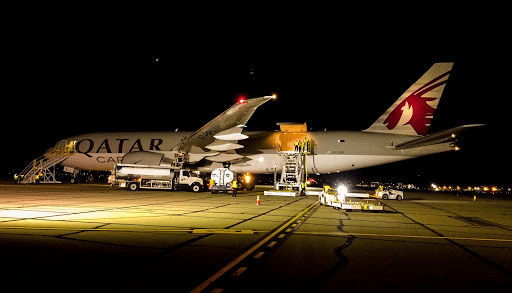On July 18, Pittsburgh International Airport announced that Sri Lanka-based Expo Freight (EFL) had agreed to make Pittsburgh its latest cargo distribution center within the U.S., using the air cargo services of its airline partner, Qatar Airways Cargo. Qatar has been serving Pittsburgh with twice-weekly freighter services since October 2017. EFL was quoted as viewing Pittsburgh as an uncongested and efficient way to distribute within the region, compared with traditional air cargo gateways in New York and Chicago, and achieve 72-hour transit times from its Indian subcontinent and Southeast Asia markets.
Using a secondary city like Pittsburgh to bypass congestion, higher costs and delays at large air cargo hubs is not a new forwarder or airline strategy. Columbus, Ohio’s Rickenbacker Airport, located a three-hour drive west of Pittsburgh, has developed a similar market strategy and has attracted six major international freighter operators with 20 weekly flights combined to-date. Global forwarder Panalpina has successfully used Huntsville, Alabama for over 20 years, partnering with Atlas and Cargolux for flight operations, as a hub for its “Dixie Jet” flights that bypass Atlanta’s air cargo hub congestion and efficiently distribute to the southeastern U.S. For air freight, eliminating delays on the ground is critical, because speed is key and a major reason shippers pay a premium over surface transport.
For Qatar Airways Cargo, one of the fastest-growing cargo carriers globally, the addition of Pittsburgh to its freighter schedule nearly two years ago added its eighth U.S. freighter destination and deepened its reach into the American market nationally with more service options for import and export freight. For Expo Freight, the Pittsburgh expansion was its seventh U.S. city, five of which are in the eastern or midwestern U.S.
For Pittsburgh though, this was its first scheduled international all-cargo operation, giving it a foothold in the market for heavy air cargo. So how does this new entrant continue to build on its initial success in becoming a more established part of the U.S. distribution and supply chain? It is not uncommon for freighter operators to enter markets and adjust schedules (or even leave markets) quickly for adverse market conditions, but Qatar Airways Cargo’s ability to stay the course as a lone freighter entrant for two years is noteworthy.

(Photo credit: Pittsburgh International Airport)
FreightWaves spoke with Bryan Dietz, Vice President of Air Service Development at Pittsburgh International Airport, to better understand the airport’s go-forward strategy for cargo. Dietz noted, “Pittsburgh historically has been known for its role in transportation dating back to the strategic location of Pittsburgh along three major rivers and its extensive rail freight system since the early days of the United States. Pittsburgh is unique with its geographic location halfway between Chicago and New York that enables companies to reach 45 percent of the United States population within one day’s truck drive.”
“When EFL and Qatar picked Pittsburgh, we know they had a choice as to where they could go and we invested our focus to ensure the time cargo spends at our airport to the distribution center is measured in hours, not days. The awareness of how Pittsburgh is a unique solution to solving logistics challenges in North America is still being heard around the air cargo industry. This was the same experience we heard with passenger carriers when we started talking with them about our airport and market – they said, ‘Really, this is Pittsburgh?’ There is a surprise to how the region has re-emerged with new industries in the market. We are hearing that with those in the air cargo industry also and even more so now that EFL and Qatar have made this announcement in Pittsburgh.”
With companies of Qatar Cargo’s and EFL’s size in Pittsburgh, there are positive spin-off effects that deepen the city’s expertise in international logistics and distribution. It remains to be seen though, how quickly these synergies play out in bringing other airlines and forwarders into the market.
In regard to the competition from Columbus Rickenbacker and other airports and how Pittsburgh differentiates itself, Dietz noted, ”We are always benchmarking best practices, not only from other airports but also from other modes of transportation and even other industries. Our goal is to transform the industry by the way we operate as an airport and we learn a lot of that through other airports but also other companies and industry sectors. That is why we are modernizing our passenger facilities to ensure we shift space from areas where we have too much space such as the gates, to areas where we need it more as an O&D [origin and destination] airport such as the landside functions. We want to think of and innovate what is best for our customers just as many logistics companies do today.”
Dietz continued, “Pittsburgh is in a very unique position as we have transitioned from a former connecting hub market to a strong O&D market in that we have the infrastructure and space to support cargo at our airport. When our airport and airfield was designed and built, being able to have the airfield and available land to grow aviation was a major focus at the time that we are benefiting from today. We feel with the design of our airfield and some unique lessons learned though welcoming other international carriers to PIT, that we have a unique collaborative approach with our stakeholders such as companies in the Pittsburgh region, U.S. Customs and Border Patrol and ground handlers that bring unique speed and attention to airlines flying to PIT.”
Aside from the Qatar freighter program, Pittsburgh has worked to attract nonstop international passenger service that can generate 10 to 15 tons of belly cargo capacity when wide-bodied aircraft are used. Earlier this spring, Pittsburgh secured new British Airways nonstop Boeing 787 service to London Heathrow with four weekly flights on a year-round basis, and seasonal service on Condor, a German leisure carrier, to Frankfurt. The service on British Airways offers local shippers connections to British’s large widebody and narrowbody global flight network beyond London. Dietz noted that the airport’s current focus was ensuring these new services are successful for both passenger and cargo bookings, with the immediate goal of getting London service expanded to daily flights, and Frankfurt flights extended to year-round.

(Photo credit: Pittsburgh International Airport)
Dietz added that other trans-Atlantic opportunities are available but the airport seeks to complement the success to-date with British and Condor. As for whether those opportunities would be in cargo-friendly wide-bodies, Dietz responded that it could go either way. “Whether that route would be on a wide-body or narrow-body aircraft is a very interesting question. As the transatlantic market continues to evolve with aircraft technology such as the B787 and new narrow-body fleets by multiple manufacturers, Pittsburgh becomes an even more sustainable market when combined with our growing economy.”
With forwarder consolidation programs around large air gateways in the U.S., one major challenge non-gateway airports like Pittsburgh and airlines have is finding a large and consistent “baseload” of local export traffic that can be flown directly and is not trucked to the primary regional gateways of New York JFK, Chicago O’Hare or even Atlanta Hartsfield-Jackson International Airport.
We asked Dietz how Pittsburgh was managing this challenge. He stated, “We are very pragmatic in realizing awareness about the Pittsburgh airport is still developing compared to gateways in New York and Chicago. As this awareness grows, we have been pleased with the initial responsiveness from the Pittsburgh market and our goal is to engage the Pittsburgh market further to fill the aircraft more in both directions. We know exports in the U.S. can be harder than finding imports, though we are fortunate in the Pittsburgh region to have a community that works together and steps up to support the airport. Our local shippers and companies realize that air service, whether a passenger or cargo route, means economic development for the Pittsburgh region as a whole. This partnership approach makes a big difference in helping to support new carriers such as Qatar Airways Cargo and our community is thrilled to have scheduled international freighter service – for the first time in our airport’s history. They have seen first-hand the benefits of shorter truck times, no congestion and the network of a global carrier such as Qatar Airways that have made their supply chain stronger and more diversified.”










